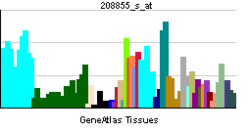STK24
| View/Edit Human | View/Edit Mouse |
Serine/threonine-protein kinase 24 is an enzyme that in humans is encoded by the STK24 gene.[5][6][7]
The yeast 'Sterile 20' gene (STE20) functions upstream of the mitogen-activated protein kinase (MAPK) cascade. In mammals, protein kinases related to STE20 can be divided into 2 subfamilies based on their structure and regulation. Members of the PAK subfamily (see PAK3; MIM 300142) contain a C-terminal catalytic domain and an N-terminal regulatory domain that has a CDC42 (MIM 116952)-binding domain. In contrast, members of the GCK subfamily (see MAP4K2; MIM 603166), also called the Sps1 subfamily, have an N-terminal catalytic domain and a C-terminal regulatory domain without a CDC42-binding domain. STK24 belongs to the GCK subfamily of STE20-like kinases (Zhou et al., 2000).[supplied by OMIM][7]
Interactions
STK24 has been shown to interact with PDCD10,[8][9][10] TRAF3IP3,[10] STRN3,[9][10] MOBKL3,[9][10] STRN,[9][10] SLMAP,[9][10] PPP2R1A,[9][10] CTTNBP2NL,[10] FAM40A[9][10] and STRN4.[9][10]
References
- ↑ "Diseases that are genetically associated with STK24 view/edit references on wikidata".
- ↑ "Drugs that physically interact with Serine/threonine-protein kinase 24 view/edit references on wikidata".
- ↑ "Human PubMed Reference:".
- ↑ "Mouse PubMed Reference:".
- ↑ Schinkmann K, Blenis J (Dec 1997). "Cloning and characterization of a human STE20-like protein kinase with unusual cofactor requirements". J Biol Chem. 272 (45): 28695–703. doi:10.1074/jbc.272.45.28695. PMID 9353338.
- ↑ Zhou TH, Ling K, Guo J, Zhou H, Wu YL, Jing Q, Ma L, Pei G (Feb 2000). "Identification of a human brain-specific isoform of mammalian STE20-like kinase 3 that is regulated by cAMP-dependent protein kinase". J Biol Chem. 275 (4): 2513–9. doi:10.1074/jbc.275.4.2513. PMID 10644707.
- 1 2 "Entrez Gene: STK24 serine/threonine kinase 24 (STE20 homolog, yeast)".
- ↑ Rual JF, Venkatesan K, Hao T, Hirozane-Kishikawa T, Dricot A, Li N, Berriz GF, Gibbons FD, Dreze M, Ayivi-Guedehoussou N, Klitgord N, Simon C, Boxem M, Milstein S, Rosenberg J, Goldberg DS, Zhang LV, Wong SL, Franklin G, Li S, Albala JS, Lim J, Fraughton C, Llamosas E, Cevik S, Bex C, Lamesch P, Sikorski RS, Vandenhaute J, Zoghbi HY, Smolyar A, Bosak S, Sequerra R, Doucette-Stamm L, Cusick ME, Hill DE, Roth FP, Vidal M (Oct 2005). "Towards a proteome-scale map of the human protein-protein interaction network". Nature. England. 437 (7062): 1173–8. doi:10.1038/nature04209. PMID 16189514.
- 1 2 3 4 5 6 7 8 Ewing RM, Chu P, Elisma F, Li H, Taylor P, Climie S, McBroom-Cerajewski L, Robinson MD, O'Connor L, Li M, Taylor R, Dharsee M, Ho Y, Heilbut A, Moore L, Zhang S, Ornatsky O, Bukhman YV, Ethier M, Sheng Y, Vasilescu J, Abu-Farha M, Lambert JP, Duewel HS, Stewart II, Kuehl B, Hogue K, Colwill K, Gladwish K, Muskat B, Kinach R, Adams SL, Moran MF, Morin GB, Topaloglou T, Figeys D (2007). "Large-scale mapping of human protein-protein interactions by mass spectrometry". Mol. Syst. Biol. England. 3 (1): 89. doi:10.1038/msb4100134. PMC 1847948
 . PMID 17353931.
. PMID 17353931. - 1 2 3 4 5 6 7 8 9 10 Goudreault M, D'Ambrosio LM, Kean MJ, Mullin MJ, Larsen BG, Sanchez A, Chaudhry S, Chen GI, Sicheri F, Nesvizhskii AI, Aebersold R, Raught B, Gingras AC (Jan 2009). "A PP2A phosphatase high density interaction network identifies a novel striatin-interacting phosphatase and kinase complex linked to the cerebral cavernous malformation 3 (CCM3) protein". Mol. Cell Proteomics. United States. 8 (1): 157–71. doi:10.1074/mcp.M800266-MCP200. PMC 2621004
 . PMID 18782753.
. PMID 18782753.
Further reading
- Christian SL, McDonough J, Liu Cy CY, et al. (2002). "An evaluation of the assembly of an approximately 15-Mb region on human chromosome 13q32-q33 linked to bipolar disorder and schizophrenia.". Genomics. 79 (5): 635–56. doi:10.1006/geno.2002.6765. PMID 11991713.
- Huang CY, Wu YM, Hsu CY, et al. (2002). "Caspase activation of mammalian sterile 20-like kinase 3 (Mst3). Nuclear translocation and induction of apoptosis.". J. Biol. Chem. 277 (37): 34367–74. doi:10.1074/jbc.M202468200. PMID 12107159.
- Strausberg RL, Feingold EA, Grouse LH, et al. (2003). "Generation and initial analysis of more than 15,000 full-length human and mouse cDNA sequences.". Proc. Natl. Acad. Sci. U.S.A. 99 (26): 16899–903. doi:10.1073/pnas.242603899. PMC 139241
 . PMID 12477932.
. PMID 12477932. - Lee WS, Hsu CY, Wang PL, et al. (2004). "Identification and characterization of the nuclear import and export signals of the mammalian Ste20-like protein kinase 3.". FEBS Lett. 572 (1-3): 41–5. doi:10.1016/j.febslet.2004.07.007. PMID 15304321.
- Gerhard DS, Wagner L, Feingold EA, et al. (2004). "The status, quality, and expansion of the NIH full-length cDNA project: the Mammalian Gene Collection (MGC).". Genome Res. 14 (10B): 2121–7. doi:10.1101/gr.2596504. PMC 528928
 . PMID 15489334.
. PMID 15489334. - Rual JF, Venkatesan K, Hao T, et al. (2005). "Towards a proteome-scale map of the human protein-protein interaction network.". Nature. 437 (7062): 1173–8. doi:10.1038/nature04209. PMID 16189514.
- Stegert MR, Hergovich A, Tamaskovic R, et al. (2006). "Regulation of NDR protein kinase by hydrophobic motif phosphorylation mediated by the mammalian Ste20-like kinase MST3.". Mol. Cell. Biol. 25 (24): 11019–29. doi:10.1128/MCB.25.24.11019-11029.2005. PMC 1316964
 . PMID 16314523.
. PMID 16314523. - Kimura K, Wakamatsu A, Suzuki Y, et al. (2006). "Diversification of transcriptional modulation: large-scale identification and characterization of putative alternative promoters of human genes.". Genome Res. 16 (1): 55–65. doi:10.1101/gr.4039406. PMC 1356129
 . PMID 16344560.
. PMID 16344560. - Lu TJ, Lai WY, Huang CY, et al. (2007). "Inhibition of cell migration by autophosphorylated mammalian sterile 20-like kinase 3 (MST3) involves paxillin and protein-tyrosine phosphatase-PEST.". J. Biol. Chem. 281 (50): 38405–17. doi:10.1074/jbc.M605035200. PMID 17046825.
- Olsen JV, Blagoev B, Gnad F, et al. (2006). "Global, in vivo, and site-specific phosphorylation dynamics in signaling networks.". Cell. 127 (3): 635–48. doi:10.1016/j.cell.2006.09.026. PMID 17081983.
- Ewing RM, Chu P, Elisma F, et al. (2007). "Large-scale mapping of human protein-protein interactions by mass spectrometry.". Mol. Syst. Biol. 3 (1): 89. doi:10.1038/msb4100134. PMC 1847948
 . PMID 17353931.
. PMID 17353931.



